LAW00150 - Business Law Assignment 2: Contractual Law Problems
VerifiedAdded on 2023/06/13
|11
|2293
|391
Homework Assignment
AI Summary
This assignment presents solutions to six business law problems, primarily focusing on contract law principles. The first problem examines the intention to be legally bound in an agreement between siblings, referencing the case of Jones v Padavatton. The second problem addresses the validity of consideration in relation to existing public duties, comparing England v Davidson and Gray v Martino. The third problem discusses partial payments of debts and the Pinnel's case, alongside Foakes v Beer. The fourth problem analyzes whether an expression constitutes a contractual term, citing Interfoto Picture Library v Stiletto Visual Programes. The fifth problem explores banned sections in contracts, referencing Curtis v Chemical Cleaning Co. Lastly, the sixth problem discusses sales of goods and implied conditions, referring to David Jones v Willis and s. 19 of the GA 1958, concluding with whether Sanders can make a successful claim. Desklib offers more solved assignments for students.
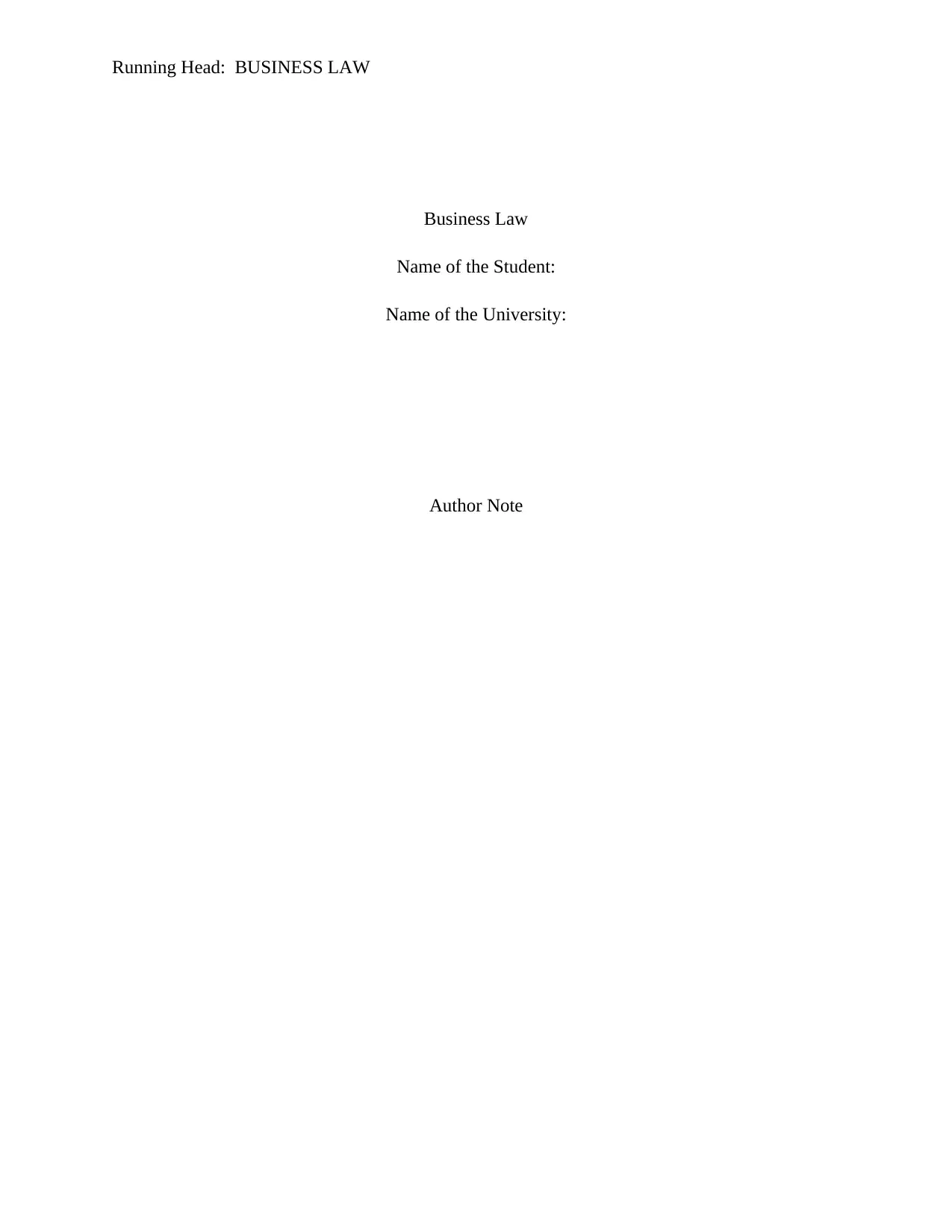
Running Head: BUSINESS LAW
Business Law
Name of the Student:
Name of the University:
Author Note
Business Law
Name of the Student:
Name of the University:
Author Note
Paraphrase This Document
Need a fresh take? Get an instant paraphrase of this document with our AI Paraphraser
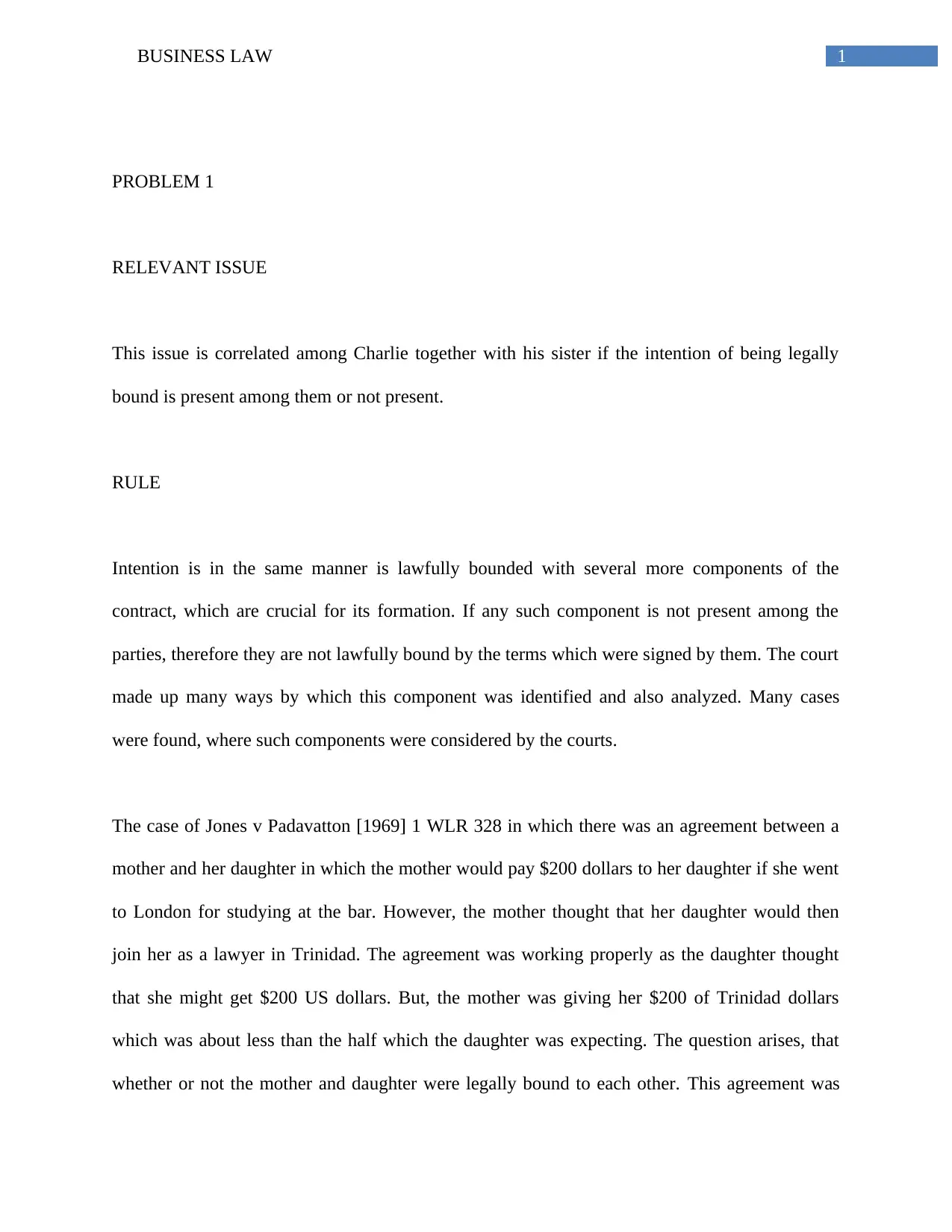
1BUSINESS LAW
PROBLEM 1
RELEVANT ISSUE
This issue is correlated among Charlie together with his sister if the intention of being legally
bound is present among them or not present.
RULE
Intention is in the same manner is lawfully bounded with several more components of the
contract, which are crucial for its formation. If any such component is not present among the
parties, therefore they are not lawfully bound by the terms which were signed by them. The court
made up many ways by which this component was identified and also analyzed. Many cases
were found, where such components were considered by the courts.
The case of Jones v Padavatton [1969] 1 WLR 328 in which there was an agreement between a
mother and her daughter in which the mother would pay $200 dollars to her daughter if she went
to London for studying at the bar. However, the mother thought that her daughter would then
join her as a lawyer in Trinidad. The agreement was working properly as the daughter thought
that she might get $200 US dollars. But, the mother was giving her $200 of Trinidad dollars
which was about less than the half which the daughter was expecting. The question arises, that
whether or not the mother and daughter were legally bound to each other. This agreement was
PROBLEM 1
RELEVANT ISSUE
This issue is correlated among Charlie together with his sister if the intention of being legally
bound is present among them or not present.
RULE
Intention is in the same manner is lawfully bounded with several more components of the
contract, which are crucial for its formation. If any such component is not present among the
parties, therefore they are not lawfully bound by the terms which were signed by them. The court
made up many ways by which this component was identified and also analyzed. Many cases
were found, where such components were considered by the courts.
The case of Jones v Padavatton [1969] 1 WLR 328 in which there was an agreement between a
mother and her daughter in which the mother would pay $200 dollars to her daughter if she went
to London for studying at the bar. However, the mother thought that her daughter would then
join her as a lawyer in Trinidad. The agreement was working properly as the daughter thought
that she might get $200 US dollars. But, the mother was giving her $200 of Trinidad dollars
which was about less than the half which the daughter was expecting. The question arises, that
whether or not the mother and daughter were legally bound to each other. This agreement was
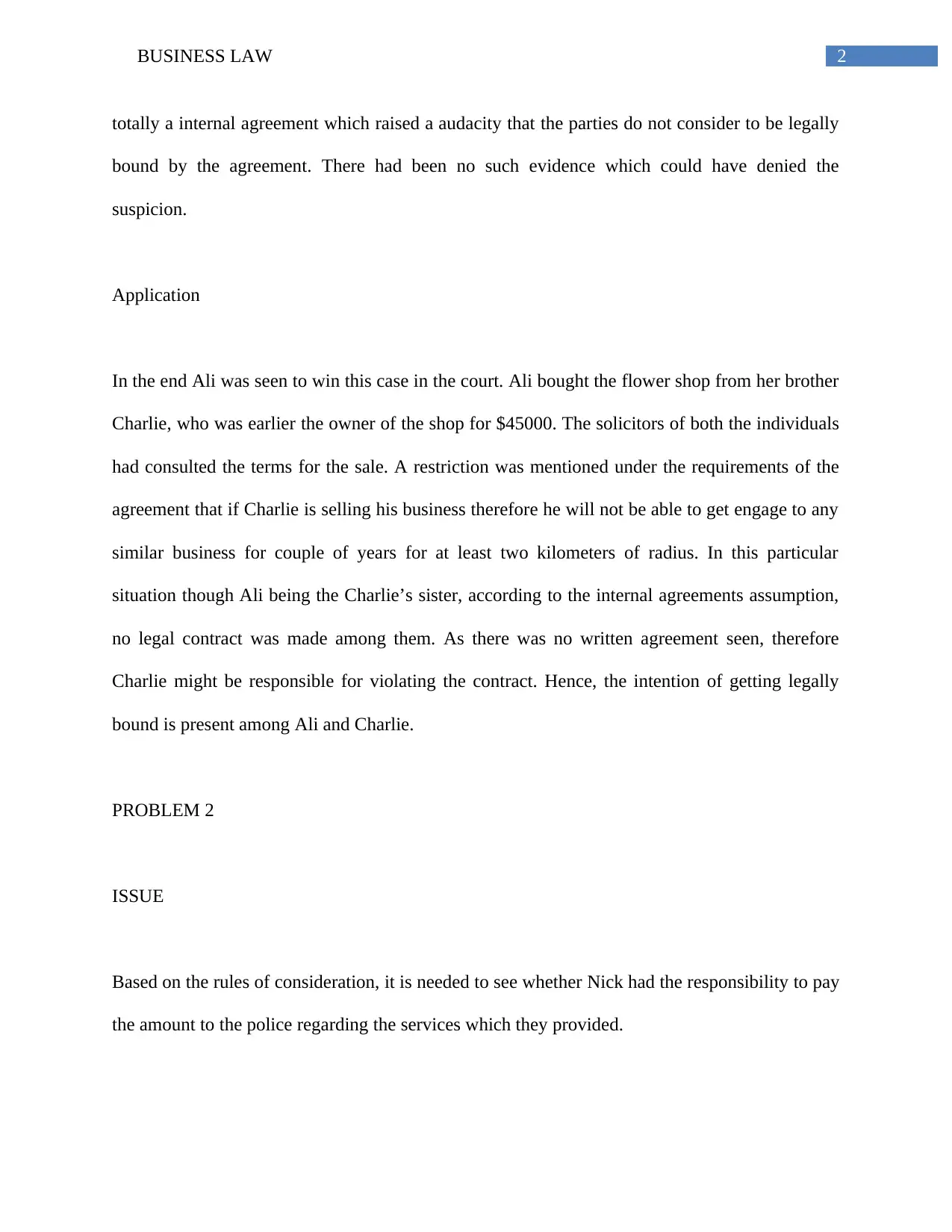
2BUSINESS LAW
totally a internal agreement which raised a audacity that the parties do not consider to be legally
bound by the agreement. There had been no such evidence which could have denied the
suspicion.
Application
In the end Ali was seen to win this case in the court. Ali bought the flower shop from her brother
Charlie, who was earlier the owner of the shop for $45000. The solicitors of both the individuals
had consulted the terms for the sale. A restriction was mentioned under the requirements of the
agreement that if Charlie is selling his business therefore he will not be able to get engage to any
similar business for couple of years for at least two kilometers of radius. In this particular
situation though Ali being the Charlie’s sister, according to the internal agreements assumption,
no legal contract was made among them. As there was no written agreement seen, therefore
Charlie might be responsible for violating the contract. Hence, the intention of getting legally
bound is present among Ali and Charlie.
PROBLEM 2
ISSUE
Based on the rules of consideration, it is needed to see whether Nick had the responsibility to pay
the amount to the police regarding the services which they provided.
totally a internal agreement which raised a audacity that the parties do not consider to be legally
bound by the agreement. There had been no such evidence which could have denied the
suspicion.
Application
In the end Ali was seen to win this case in the court. Ali bought the flower shop from her brother
Charlie, who was earlier the owner of the shop for $45000. The solicitors of both the individuals
had consulted the terms for the sale. A restriction was mentioned under the requirements of the
agreement that if Charlie is selling his business therefore he will not be able to get engage to any
similar business for couple of years for at least two kilometers of radius. In this particular
situation though Ali being the Charlie’s sister, according to the internal agreements assumption,
no legal contract was made among them. As there was no written agreement seen, therefore
Charlie might be responsible for violating the contract. Hence, the intention of getting legally
bound is present among Ali and Charlie.
PROBLEM 2
ISSUE
Based on the rules of consideration, it is needed to see whether Nick had the responsibility to pay
the amount to the police regarding the services which they provided.
⊘ This is a preview!⊘
Do you want full access?
Subscribe today to unlock all pages.

Trusted by 1+ million students worldwide
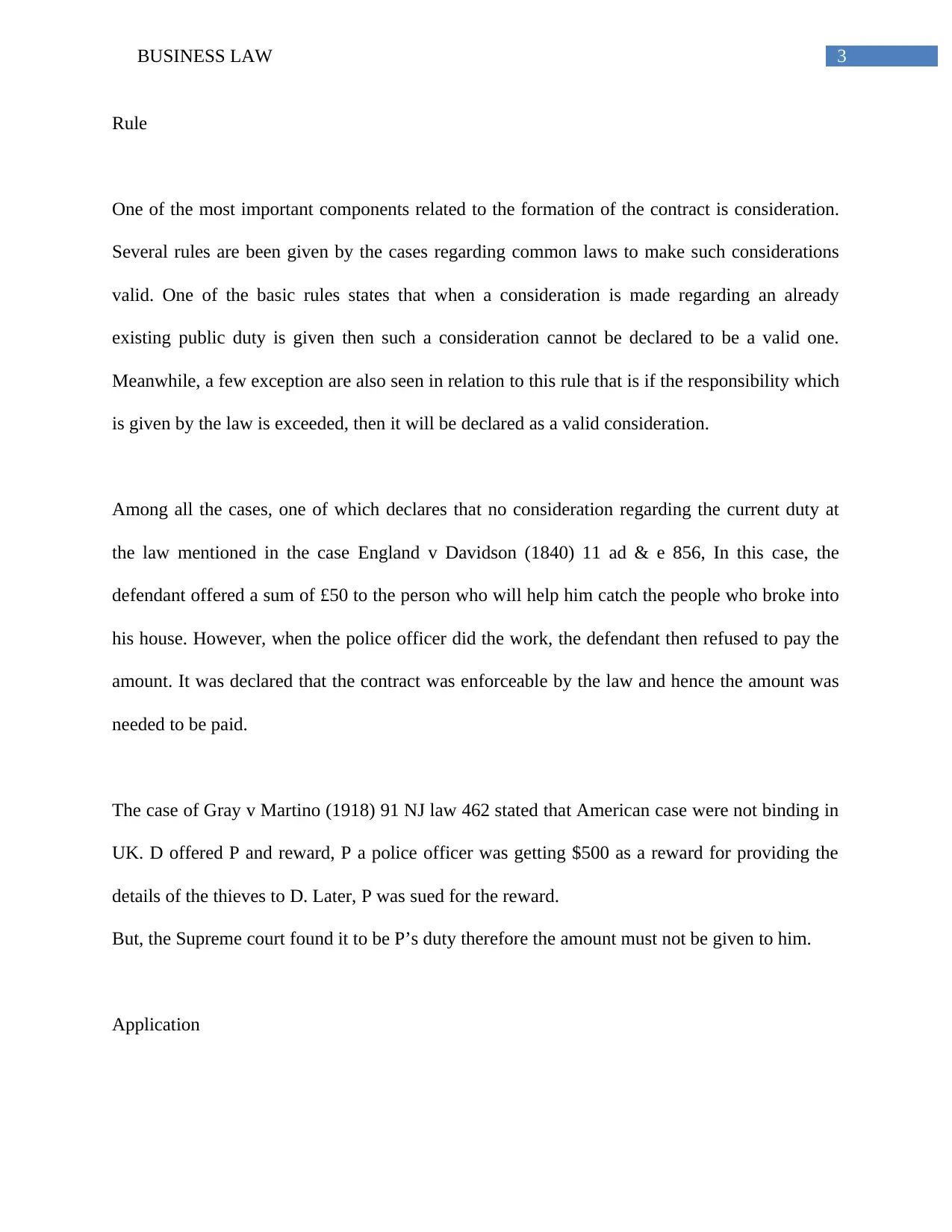
3BUSINESS LAW
Rule
One of the most important components related to the formation of the contract is consideration.
Several rules are been given by the cases regarding common laws to make such considerations
valid. One of the basic rules states that when a consideration is made regarding an already
existing public duty is given then such a consideration cannot be declared to be a valid one.
Meanwhile, a few exception are also seen in relation to this rule that is if the responsibility which
is given by the law is exceeded, then it will be declared as a valid consideration.
Among all the cases, one of which declares that no consideration regarding the current duty at
the law mentioned in the case England v Davidson (1840) 11 ad & e 856, In this case, the
defendant offered a sum of £50 to the person who will help him catch the people who broke into
his house. However, when the police officer did the work, the defendant then refused to pay the
amount. It was declared that the contract was enforceable by the law and hence the amount was
needed to be paid.
The case of Gray v Martino (1918) 91 NJ law 462 stated that American case were not binding in
UK. D offered P and reward, P a police officer was getting $500 as a reward for providing the
details of the thieves to D. Later, P was sued for the reward.
But, the Supreme court found it to be P’s duty therefore the amount must not be given to him.
Application
Rule
One of the most important components related to the formation of the contract is consideration.
Several rules are been given by the cases regarding common laws to make such considerations
valid. One of the basic rules states that when a consideration is made regarding an already
existing public duty is given then such a consideration cannot be declared to be a valid one.
Meanwhile, a few exception are also seen in relation to this rule that is if the responsibility which
is given by the law is exceeded, then it will be declared as a valid consideration.
Among all the cases, one of which declares that no consideration regarding the current duty at
the law mentioned in the case England v Davidson (1840) 11 ad & e 856, In this case, the
defendant offered a sum of £50 to the person who will help him catch the people who broke into
his house. However, when the police officer did the work, the defendant then refused to pay the
amount. It was declared that the contract was enforceable by the law and hence the amount was
needed to be paid.
The case of Gray v Martino (1918) 91 NJ law 462 stated that American case were not binding in
UK. D offered P and reward, P a police officer was getting $500 as a reward for providing the
details of the thieves to D. Later, P was sued for the reward.
But, the Supreme court found it to be P’s duty therefore the amount must not be given to him.
Application
Paraphrase This Document
Need a fresh take? Get an instant paraphrase of this document with our AI Paraphraser
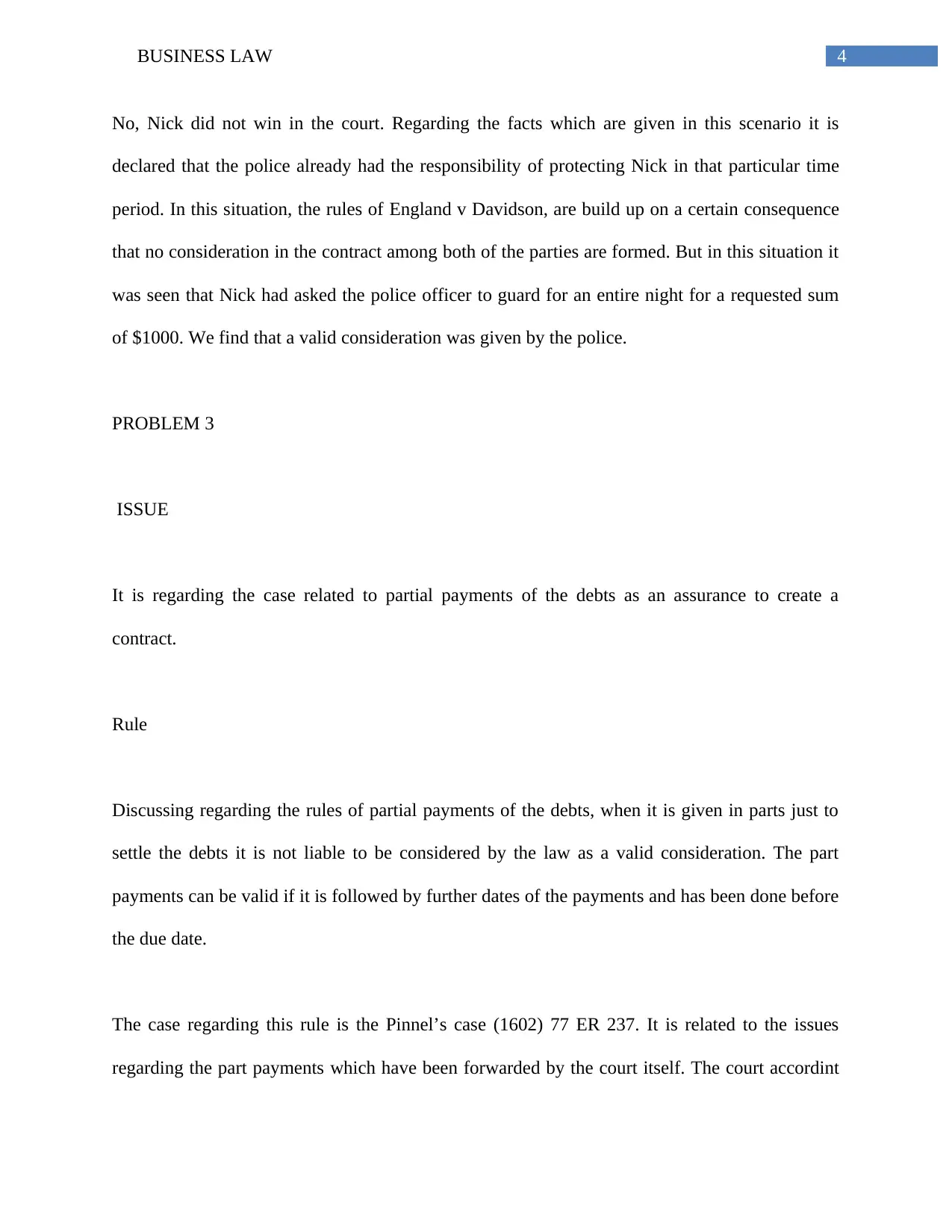
4BUSINESS LAW
No, Nick did not win in the court. Regarding the facts which are given in this scenario it is
declared that the police already had the responsibility of protecting Nick in that particular time
period. In this situation, the rules of England v Davidson, are build up on a certain consequence
that no consideration in the contract among both of the parties are formed. But in this situation it
was seen that Nick had asked the police officer to guard for an entire night for a requested sum
of $1000. We find that a valid consideration was given by the police.
PROBLEM 3
ISSUE
It is regarding the case related to partial payments of the debts as an assurance to create a
contract.
Rule
Discussing regarding the rules of partial payments of the debts, when it is given in parts just to
settle the debts it is not liable to be considered by the law as a valid consideration. The part
payments can be valid if it is followed by further dates of the payments and has been done before
the due date.
The case regarding this rule is the Pinnel’s case (1602) 77 ER 237. It is related to the issues
regarding the part payments which have been forwarded by the court itself. The court accordint
No, Nick did not win in the court. Regarding the facts which are given in this scenario it is
declared that the police already had the responsibility of protecting Nick in that particular time
period. In this situation, the rules of England v Davidson, are build up on a certain consequence
that no consideration in the contract among both of the parties are formed. But in this situation it
was seen that Nick had asked the police officer to guard for an entire night for a requested sum
of $1000. We find that a valid consideration was given by the police.
PROBLEM 3
ISSUE
It is regarding the case related to partial payments of the debts as an assurance to create a
contract.
Rule
Discussing regarding the rules of partial payments of the debts, when it is given in parts just to
settle the debts it is not liable to be considered by the law as a valid consideration. The part
payments can be valid if it is followed by further dates of the payments and has been done before
the due date.
The case regarding this rule is the Pinnel’s case (1602) 77 ER 237. It is related to the issues
regarding the part payments which have been forwarded by the court itself. The court accordint
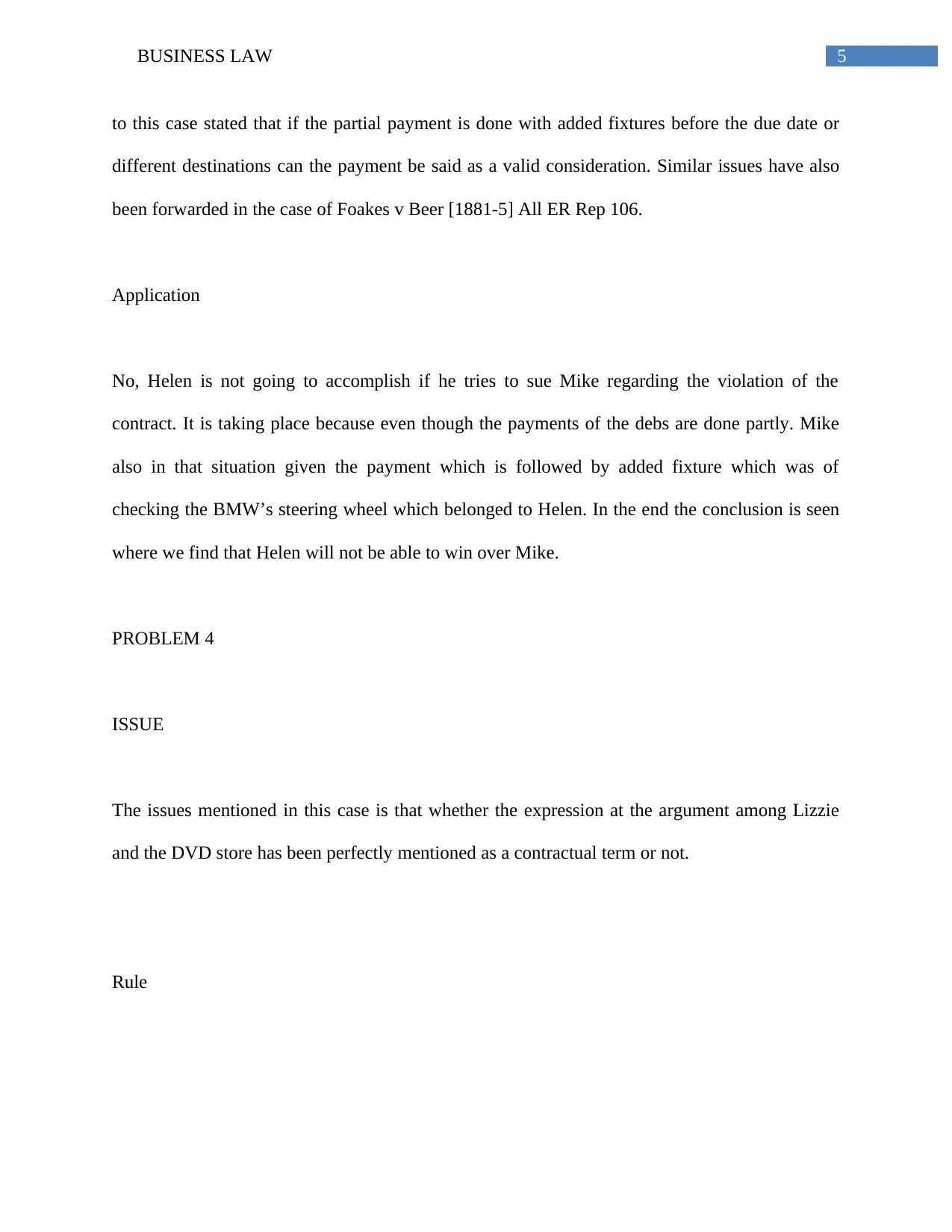
5BUSINESS LAW
to this case stated that if the partial payment is done with added fixtures before the due date or
different destinations can the payment be said as a valid consideration. Similar issues have also
been forwarded in the case of Foakes v Beer [1881-5] All ER Rep 106.
Application
No, Helen is not going to accomplish if he tries to sue Mike regarding the violation of the
contract. It is taking place because even though the payments of the debs are done partly. Mike
also in that situation given the payment which is followed by added fixture which was of
checking the BMW’s steering wheel which belonged to Helen. In the end the conclusion is seen
where we find that Helen will not be able to win over Mike.
PROBLEM 4
ISSUE
The issues mentioned in this case is that whether the expression at the argument among Lizzie
and the DVD store has been perfectly mentioned as a contractual term or not.
Rule
to this case stated that if the partial payment is done with added fixtures before the due date or
different destinations can the payment be said as a valid consideration. Similar issues have also
been forwarded in the case of Foakes v Beer [1881-5] All ER Rep 106.
Application
No, Helen is not going to accomplish if he tries to sue Mike regarding the violation of the
contract. It is taking place because even though the payments of the debs are done partly. Mike
also in that situation given the payment which is followed by added fixture which was of
checking the BMW’s steering wheel which belonged to Helen. In the end the conclusion is seen
where we find that Helen will not be able to win over Mike.
PROBLEM 4
ISSUE
The issues mentioned in this case is that whether the expression at the argument among Lizzie
and the DVD store has been perfectly mentioned as a contractual term or not.
Rule
⊘ This is a preview!⊘
Do you want full access?
Subscribe today to unlock all pages.

Trusted by 1+ million students worldwide
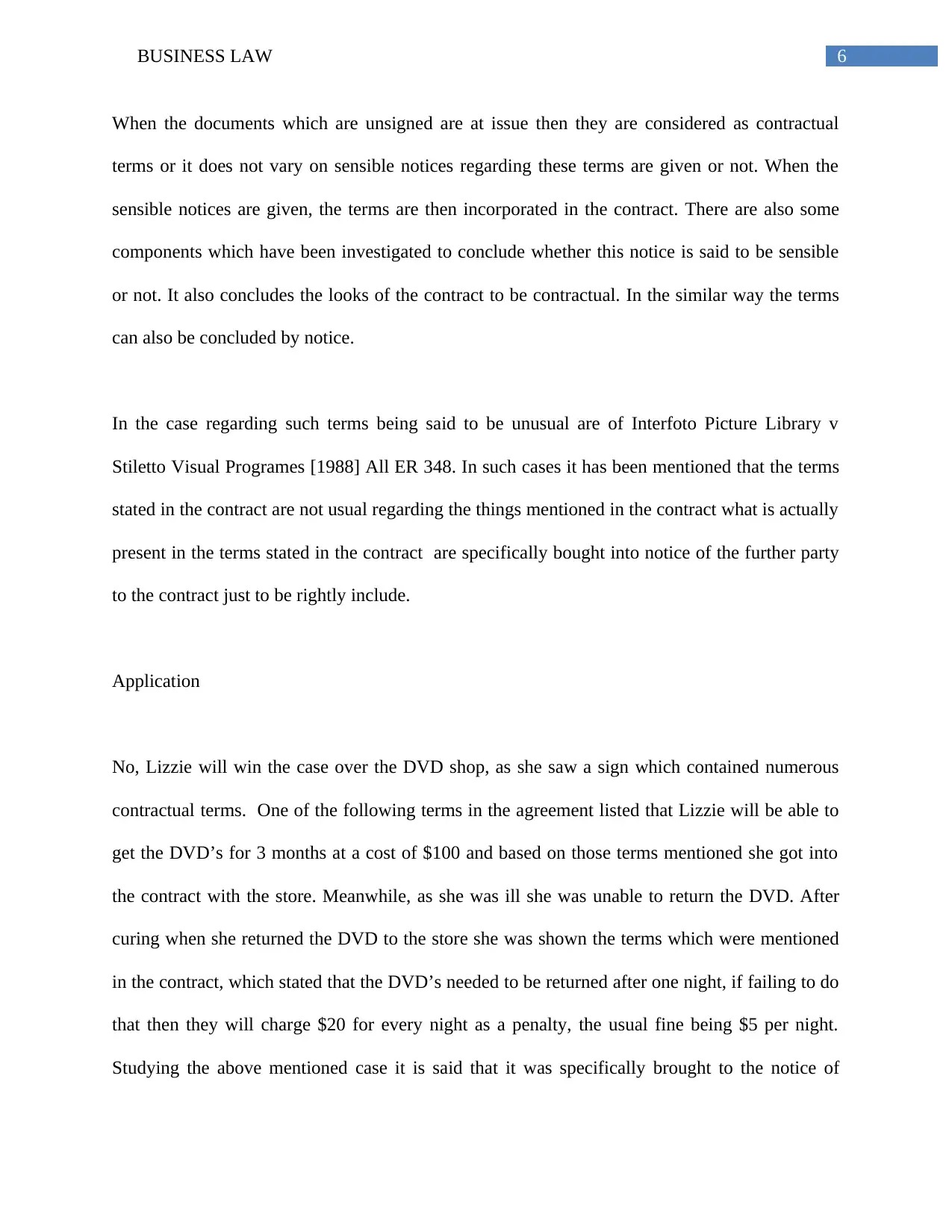
6BUSINESS LAW
When the documents which are unsigned are at issue then they are considered as contractual
terms or it does not vary on sensible notices regarding these terms are given or not. When the
sensible notices are given, the terms are then incorporated in the contract. There are also some
components which have been investigated to conclude whether this notice is said to be sensible
or not. It also concludes the looks of the contract to be contractual. In the similar way the terms
can also be concluded by notice.
In the case regarding such terms being said to be unusual are of Interfoto Picture Library v
Stiletto Visual Programes [1988] All ER 348. In such cases it has been mentioned that the terms
stated in the contract are not usual regarding the things mentioned in the contract what is actually
present in the terms stated in the contract are specifically bought into notice of the further party
to the contract just to be rightly include.
Application
No, Lizzie will win the case over the DVD shop, as she saw a sign which contained numerous
contractual terms. One of the following terms in the agreement listed that Lizzie will be able to
get the DVD’s for 3 months at a cost of $100 and based on those terms mentioned she got into
the contract with the store. Meanwhile, as she was ill she was unable to return the DVD. After
curing when she returned the DVD to the store she was shown the terms which were mentioned
in the contract, which stated that the DVD’s needed to be returned after one night, if failing to do
that then they will charge $20 for every night as a penalty, the usual fine being $5 per night.
Studying the above mentioned case it is said that it was specifically brought to the notice of
When the documents which are unsigned are at issue then they are considered as contractual
terms or it does not vary on sensible notices regarding these terms are given or not. When the
sensible notices are given, the terms are then incorporated in the contract. There are also some
components which have been investigated to conclude whether this notice is said to be sensible
or not. It also concludes the looks of the contract to be contractual. In the similar way the terms
can also be concluded by notice.
In the case regarding such terms being said to be unusual are of Interfoto Picture Library v
Stiletto Visual Programes [1988] All ER 348. In such cases it has been mentioned that the terms
stated in the contract are not usual regarding the things mentioned in the contract what is actually
present in the terms stated in the contract are specifically bought into notice of the further party
to the contract just to be rightly include.
Application
No, Lizzie will win the case over the DVD shop, as she saw a sign which contained numerous
contractual terms. One of the following terms in the agreement listed that Lizzie will be able to
get the DVD’s for 3 months at a cost of $100 and based on those terms mentioned she got into
the contract with the store. Meanwhile, as she was ill she was unable to return the DVD. After
curing when she returned the DVD to the store she was shown the terms which were mentioned
in the contract, which stated that the DVD’s needed to be returned after one night, if failing to do
that then they will charge $20 for every night as a penalty, the usual fine being $5 per night.
Studying the above mentioned case it is said that it was specifically brought to the notice of
Paraphrase This Document
Need a fresh take? Get an instant paraphrase of this document with our AI Paraphraser
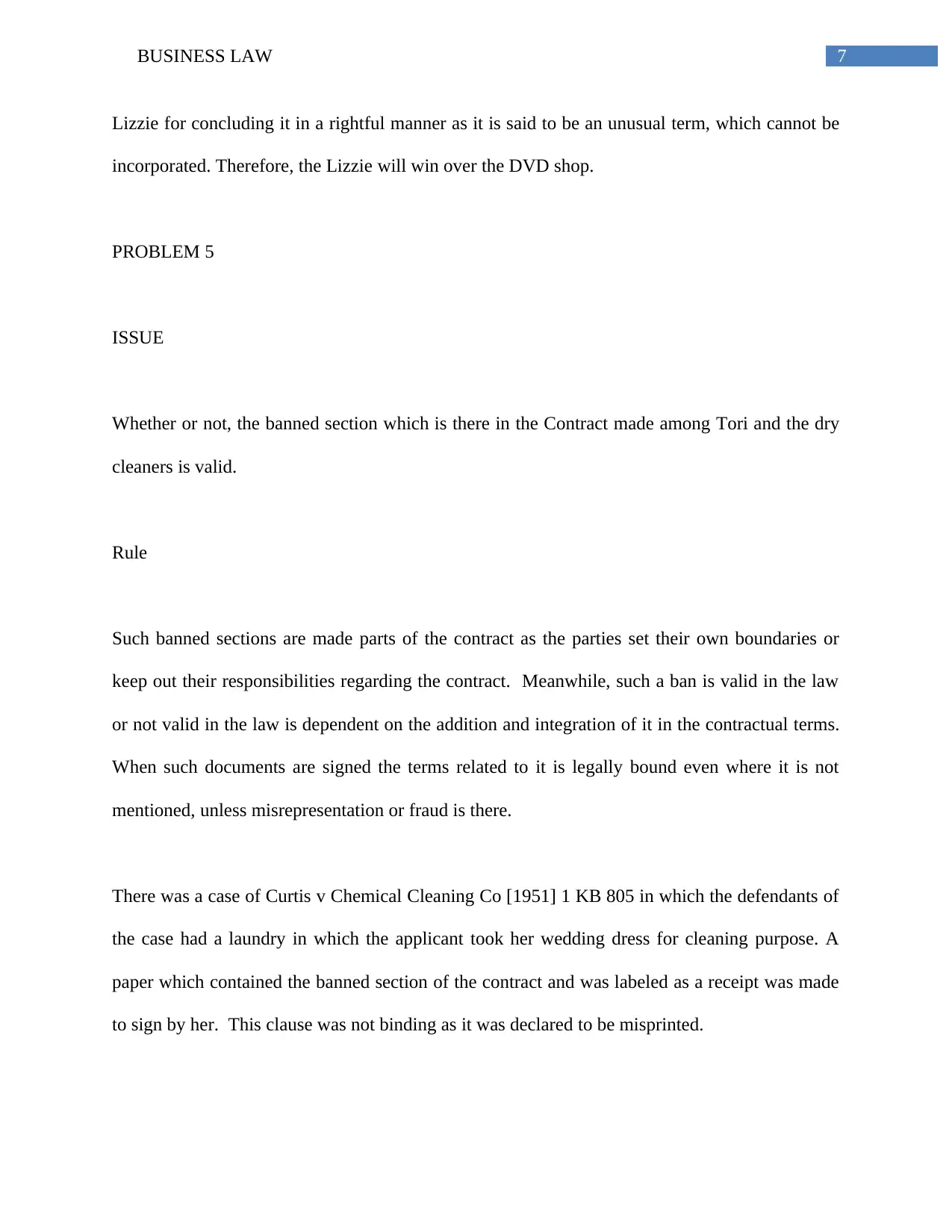
7BUSINESS LAW
Lizzie for concluding it in a rightful manner as it is said to be an unusual term, which cannot be
incorporated. Therefore, the Lizzie will win over the DVD shop.
PROBLEM 5
ISSUE
Whether or not, the banned section which is there in the Contract made among Tori and the dry
cleaners is valid.
Rule
Such banned sections are made parts of the contract as the parties set their own boundaries or
keep out their responsibilities regarding the contract. Meanwhile, such a ban is valid in the law
or not valid in the law is dependent on the addition and integration of it in the contractual terms.
When such documents are signed the terms related to it is legally bound even where it is not
mentioned, unless misrepresentation or fraud is there.
There was a case of Curtis v Chemical Cleaning Co [1951] 1 KB 805 in which the defendants of
the case had a laundry in which the applicant took her wedding dress for cleaning purpose. A
paper which contained the banned section of the contract and was labeled as a receipt was made
to sign by her. This clause was not binding as it was declared to be misprinted.
Lizzie for concluding it in a rightful manner as it is said to be an unusual term, which cannot be
incorporated. Therefore, the Lizzie will win over the DVD shop.
PROBLEM 5
ISSUE
Whether or not, the banned section which is there in the Contract made among Tori and the dry
cleaners is valid.
Rule
Such banned sections are made parts of the contract as the parties set their own boundaries or
keep out their responsibilities regarding the contract. Meanwhile, such a ban is valid in the law
or not valid in the law is dependent on the addition and integration of it in the contractual terms.
When such documents are signed the terms related to it is legally bound even where it is not
mentioned, unless misrepresentation or fraud is there.
There was a case of Curtis v Chemical Cleaning Co [1951] 1 KB 805 in which the defendants of
the case had a laundry in which the applicant took her wedding dress for cleaning purpose. A
paper which contained the banned section of the contract and was labeled as a receipt was made
to sign by her. This clause was not binding as it was declared to be misprinted.
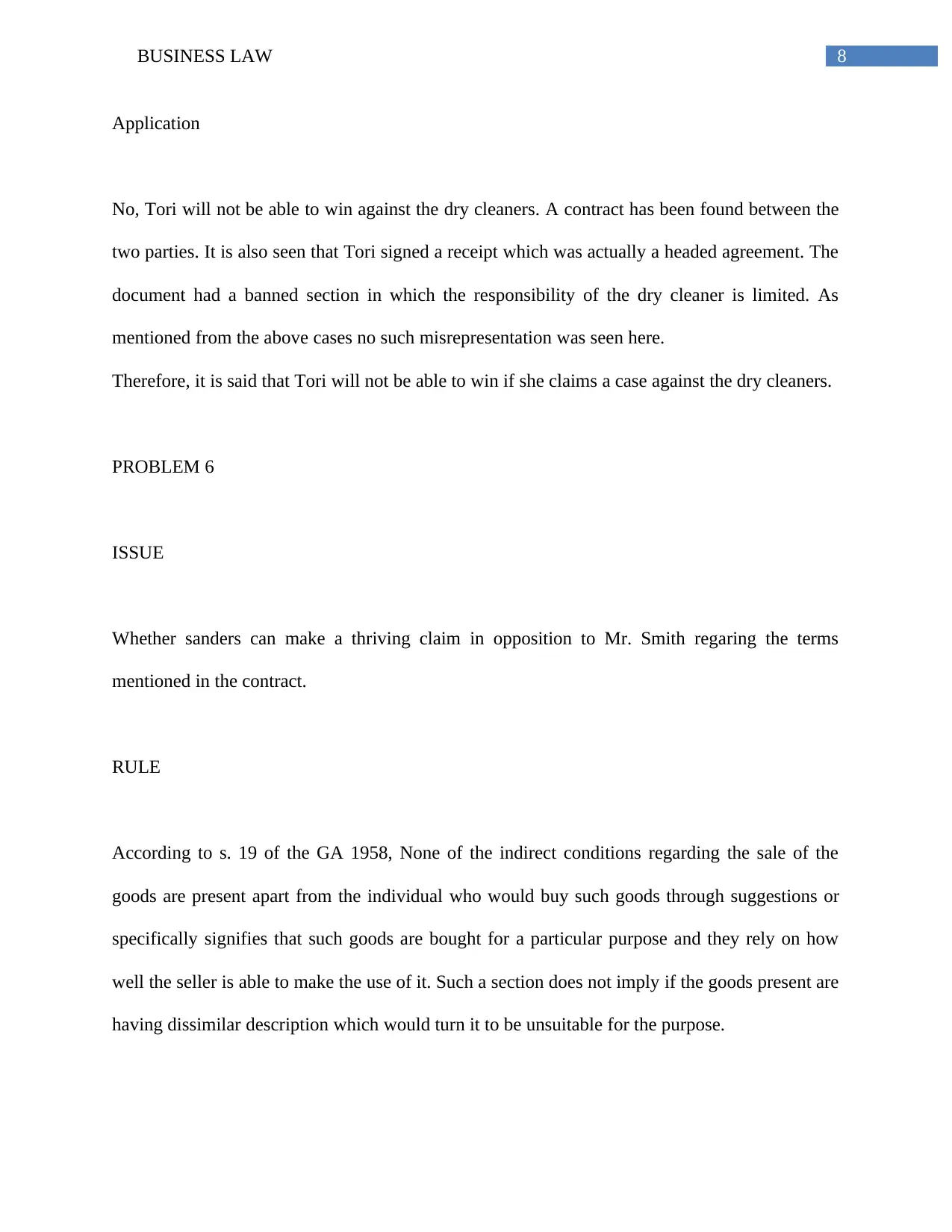
8BUSINESS LAW
Application
No, Tori will not be able to win against the dry cleaners. A contract has been found between the
two parties. It is also seen that Tori signed a receipt which was actually a headed agreement. The
document had a banned section in which the responsibility of the dry cleaner is limited. As
mentioned from the above cases no such misrepresentation was seen here.
Therefore, it is said that Tori will not be able to win if she claims a case against the dry cleaners.
PROBLEM 6
ISSUE
Whether sanders can make a thriving claim in opposition to Mr. Smith regaring the terms
mentioned in the contract.
RULE
According to s. 19 of the GA 1958, None of the indirect conditions regarding the sale of the
goods are present apart from the individual who would buy such goods through suggestions or
specifically signifies that such goods are bought for a particular purpose and they rely on how
well the seller is able to make the use of it. Such a section does not imply if the goods present are
having dissimilar description which would turn it to be unsuitable for the purpose.
Application
No, Tori will not be able to win against the dry cleaners. A contract has been found between the
two parties. It is also seen that Tori signed a receipt which was actually a headed agreement. The
document had a banned section in which the responsibility of the dry cleaner is limited. As
mentioned from the above cases no such misrepresentation was seen here.
Therefore, it is said that Tori will not be able to win if she claims a case against the dry cleaners.
PROBLEM 6
ISSUE
Whether sanders can make a thriving claim in opposition to Mr. Smith regaring the terms
mentioned in the contract.
RULE
According to s. 19 of the GA 1958, None of the indirect conditions regarding the sale of the
goods are present apart from the individual who would buy such goods through suggestions or
specifically signifies that such goods are bought for a particular purpose and they rely on how
well the seller is able to make the use of it. Such a section does not imply if the goods present are
having dissimilar description which would turn it to be unsuitable for the purpose.
⊘ This is a preview!⊘
Do you want full access?
Subscribe today to unlock all pages.

Trusted by 1+ million students worldwide
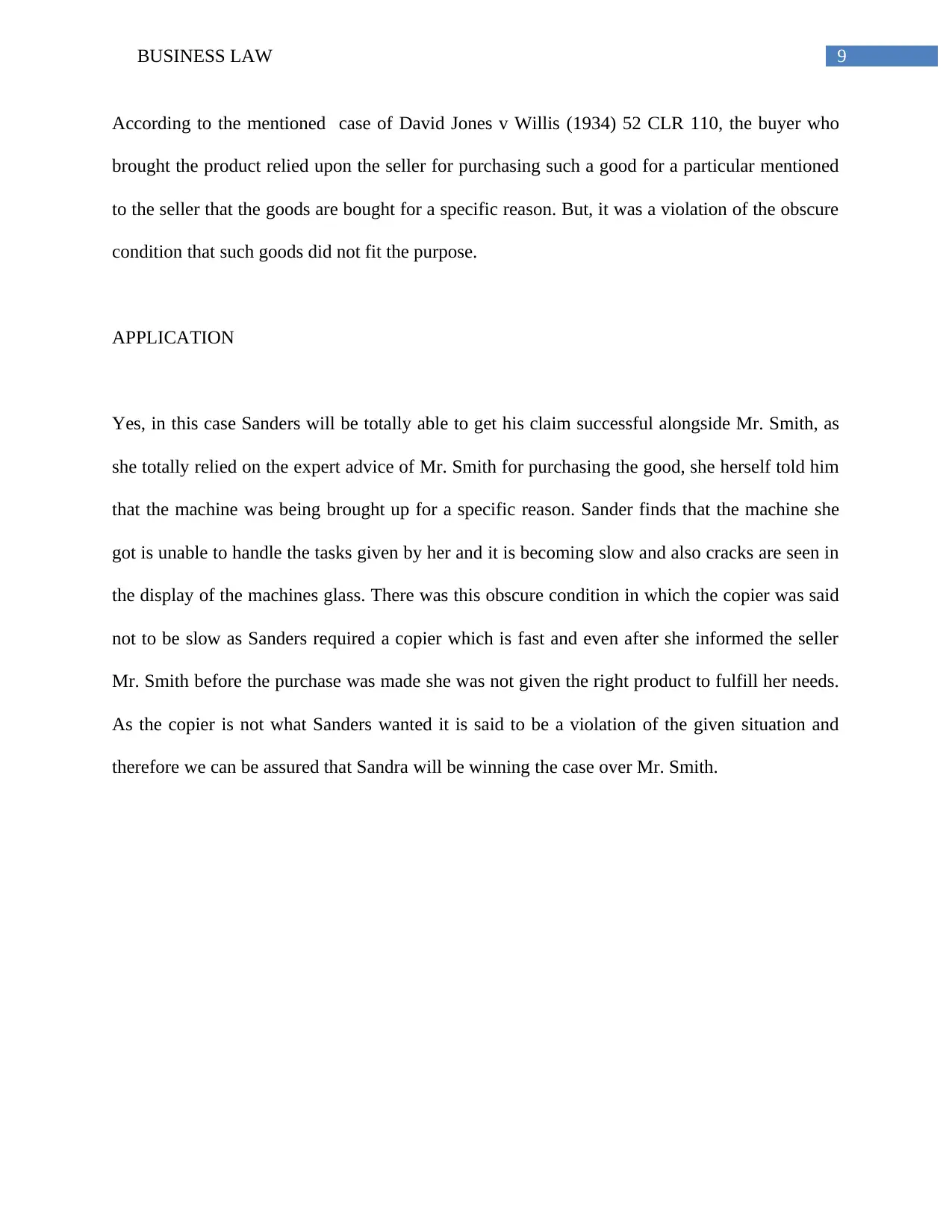
9BUSINESS LAW
According to the mentioned case of David Jones v Willis (1934) 52 CLR 110, the buyer who
brought the product relied upon the seller for purchasing such a good for a particular mentioned
to the seller that the goods are bought for a specific reason. But, it was a violation of the obscure
condition that such goods did not fit the purpose.
APPLICATION
Yes, in this case Sanders will be totally able to get his claim successful alongside Mr. Smith, as
she totally relied on the expert advice of Mr. Smith for purchasing the good, she herself told him
that the machine was being brought up for a specific reason. Sander finds that the machine she
got is unable to handle the tasks given by her and it is becoming slow and also cracks are seen in
the display of the machines glass. There was this obscure condition in which the copier was said
not to be slow as Sanders required a copier which is fast and even after she informed the seller
Mr. Smith before the purchase was made she was not given the right product to fulfill her needs.
As the copier is not what Sanders wanted it is said to be a violation of the given situation and
therefore we can be assured that Sandra will be winning the case over Mr. Smith.
According to the mentioned case of David Jones v Willis (1934) 52 CLR 110, the buyer who
brought the product relied upon the seller for purchasing such a good for a particular mentioned
to the seller that the goods are bought for a specific reason. But, it was a violation of the obscure
condition that such goods did not fit the purpose.
APPLICATION
Yes, in this case Sanders will be totally able to get his claim successful alongside Mr. Smith, as
she totally relied on the expert advice of Mr. Smith for purchasing the good, she herself told him
that the machine was being brought up for a specific reason. Sander finds that the machine she
got is unable to handle the tasks given by her and it is becoming slow and also cracks are seen in
the display of the machines glass. There was this obscure condition in which the copier was said
not to be slow as Sanders required a copier which is fast and even after she informed the seller
Mr. Smith before the purchase was made she was not given the right product to fulfill her needs.
As the copier is not what Sanders wanted it is said to be a violation of the given situation and
therefore we can be assured that Sandra will be winning the case over Mr. Smith.
Paraphrase This Document
Need a fresh take? Get an instant paraphrase of this document with our AI Paraphraser
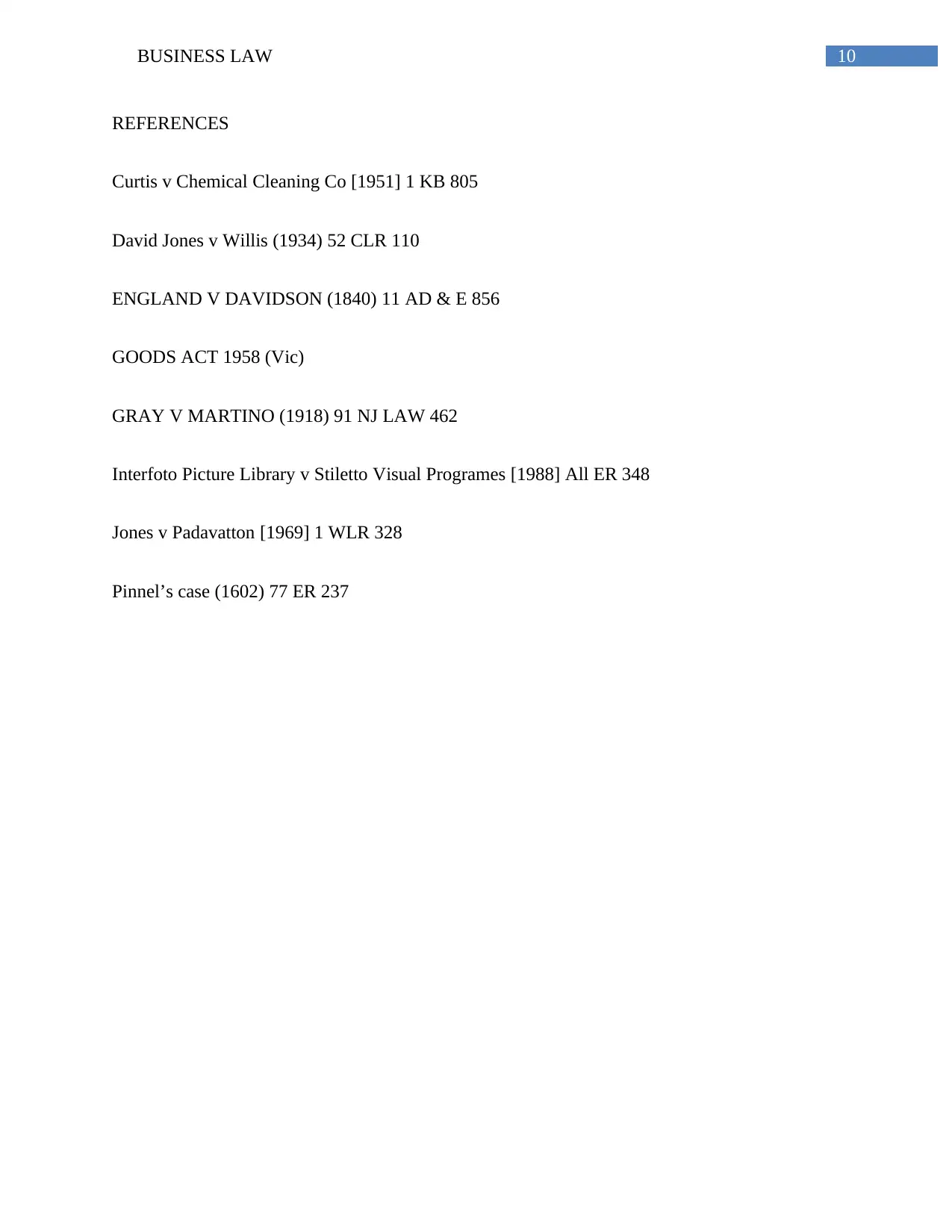
10BUSINESS LAW
REFERENCES
Curtis v Chemical Cleaning Co [1951] 1 KB 805
David Jones v Willis (1934) 52 CLR 110
ENGLAND V DAVIDSON (1840) 11 AD & E 856
GOODS ACT 1958 (Vic)
GRAY V MARTINO (1918) 91 NJ LAW 462
Interfoto Picture Library v Stiletto Visual Programes [1988] All ER 348
Jones v Padavatton [1969] 1 WLR 328
Pinnel’s case (1602) 77 ER 237
REFERENCES
Curtis v Chemical Cleaning Co [1951] 1 KB 805
David Jones v Willis (1934) 52 CLR 110
ENGLAND V DAVIDSON (1840) 11 AD & E 856
GOODS ACT 1958 (Vic)
GRAY V MARTINO (1918) 91 NJ LAW 462
Interfoto Picture Library v Stiletto Visual Programes [1988] All ER 348
Jones v Padavatton [1969] 1 WLR 328
Pinnel’s case (1602) 77 ER 237
1 out of 11
Related Documents
Your All-in-One AI-Powered Toolkit for Academic Success.
+13062052269
info@desklib.com
Available 24*7 on WhatsApp / Email
![[object Object]](/_next/static/media/star-bottom.7253800d.svg)
Unlock your academic potential
Copyright © 2020–2026 A2Z Services. All Rights Reserved. Developed and managed by ZUCOL.


